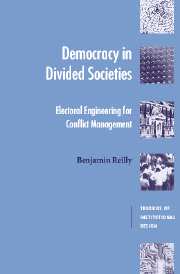Book contents
- Frontmatter
- Contents
- List of illustrations
- List of tables
- Acknowledgements
- List of abbreviations
- 1 Introduction: democracy in divided societies
- 2 The historical development of preferential voting
- 3 Centripetal incentives and political engineering in Australia
- 4 The rise and fall of centripetalism in Papua New Guinea
- 5 Electoral engineering and conflict management in divided societies (I): Fiji and Sri Lanka compared
- 6 Electoral engineering and conflict management in divided societies (II): Northern Ireland, Estonia and beyond
- 7 Technical variations and the theory of preference voting
- 8 Conclusion: assessing the evidence
- References
- Index
3 - Centripetal incentives and political engineering in Australia
Published online by Cambridge University Press: 22 September 2009
- Frontmatter
- Contents
- List of illustrations
- List of tables
- Acknowledgements
- List of abbreviations
- 1 Introduction: democracy in divided societies
- 2 The historical development of preferential voting
- 3 Centripetal incentives and political engineering in Australia
- 4 The rise and fall of centripetalism in Papua New Guinea
- 5 Electoral engineering and conflict management in divided societies (I): Fiji and Sri Lanka compared
- 6 Electoral engineering and conflict management in divided societies (II): Northern Ireland, Estonia and beyond
- 7 Technical variations and the theory of preference voting
- 8 Conclusion: assessing the evidence
- References
- Index
Summary
Introduction
Australia is a particularly interesting case of centripetalism at work for three reasons. First, the Australian experience represents by the far the best-established and longest-running example of preferential voting in the world today, with all three of the major preferential electoral systems (AV, SV and STV) having been used for elections in various jurisdictions in Australia. All three systems were also developed or substantially refined in Australia, and the Australian development of electoral institutions therefore represents one of the more distinctive national contributions to institutional design (McLean 1996, 369). Having been a feature of Australian politics since the early years of last century, preferential voting has become an embedded and well-institutionalised factor of Australian elections. Since 1963, all state, territory and federal jurisdictions have utilised preferential voting of one sort or another. The Australian experience thus enables us to examine the effects of preferential voting upon political competition over a long period in a stable political environment.
The second distinctive feature of Australia for investigation of divided societies is its combination of high degrees of ethnic diversity with low levels of inter-ethnic conflict. Australia has one of the world's most ethnically diverse populations, with approximately 40 per cent of the population being overseas-born or the offspring of overseas born immigrants, most of whom come from non-English speaking countries in southern Europe, the Middle East and Asia. According to one source, ‘Australia has the highest proportion of foreign born in the population of any advanced industrial democracy, with the possible exception of Israel’ (Bowler et al. 1996, 468).
- Type
- Chapter
- Information
- Democracy in Divided SocietiesElectoral Engineering for Conflict Management, pp. 42 - 57Publisher: Cambridge University PressPrint publication year: 2001

